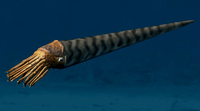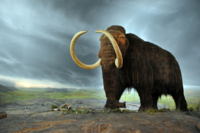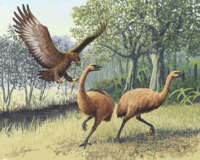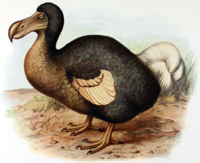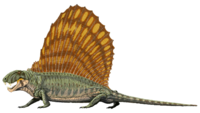Difference between revisions of "Extinction"
| (12 intermediate revisions by 2 users not shown) | |||
| Line 4: | Line 4: | ||
===About Extinction=== | ===About Extinction=== | ||
| − | + | [[Extinction]] can be caused by a number of factors: | |
*A sudden change in temperature. | *A sudden change in temperature. | ||
*A loss of habitat | *A loss of habitat | ||
| Line 10: | Line 10: | ||
*An isolated [[Biological Community|community]] comes in contact with another. | *An isolated [[Biological Community|community]] comes in contact with another. | ||
*Pollution | *Pollution | ||
| + | *Hunting | ||
===Examples=== | ===Examples=== | ||
| Line 19: | Line 20: | ||
|- | |- | ||
| style="height:20px; width:200px; text-align:center;" |Orthoceras lived until 485 million years ago. When the oceans became too cold it became '''extinct''' | | style="height:20px; width:200px; text-align:center;" |Orthoceras lived until 485 million years ago. When the oceans became too cold it became '''extinct''' | ||
| − | | style="height:20px; width:200px; text-align:center;" |The Woolly Mammoth became '''extinct''' when it lost its [[habitat]] at the end of the last [[Ice Age | + | | style="height:20px; width:200px; text-align:center;" |The Woolly Mammoth became '''extinct''' when it lost its [[habitat]] at the end of the last [[Ice Age]] 10,000 years ago. |
| style="height:20px; width:200px; text-align:center;" |Haast's Eagle was the biggest eagle to ever exist, but it became '''extinct''' when humans killed all of its [[prey]]. | | style="height:20px; width:200px; text-align:center;" |Haast's Eagle was the biggest eagle to ever exist, but it became '''extinct''' when humans killed all of its [[prey]]. | ||
|- | |- | ||
| Line 26: | Line 27: | ||
|- | |- | ||
| style="height:20px; width:200px; text-align:center;" |The Dodo lived on a small island with no [[predator]]s to kill it. When humans arrived, rats came with them and ate all the dodo eggs making them '''extinct'''. | | style="height:20px; width:200px; text-align:center;" |The Dodo lived on a small island with no [[predator]]s to kill it. When humans arrived, rats came with them and ate all the dodo eggs making them '''extinct'''. | ||
| − | | style="height:20px; width:200px; text-align:center;" |272 million years ago the [[atmosphere]] became [[pollution|polluted]] with [[Hydrogen Sulphide | + | | style="height:20px; width:200px; text-align:center;" |272 million years ago the [[atmosphere]] became [[pollution|polluted]] with [[Hydrogen Sulphide]] [[gas]], causing all the dimetrodons to suffocate, making them '''extinct'''. |
|} | |} | ||
| + | |||
| + | ==Key Stage 4== | ||
| + | ===Meaning=== | ||
| + | [[Extinction]] is when all of the members of a [[species]] have died. | ||
| + | |||
| + | ===About Extinction=== | ||
| + | [[Extinction]] can be caused by a number of factors: | ||
| + | *A sudden change in temperature. | ||
| + | *A loss of habitat | ||
| + | *A food source disappearing. | ||
| + | *An isolated [[Biological Community|community]] comes in contact with another. | ||
| + | *Pollution | ||
| + | *Hunting | ||
| + | |||
| + | ===Mass Extinctions=== | ||
| + | When a [[community]] of many different [[species]] become '''extinct''' it is known as a [[Mass Extinction|mass extinction]]. | ||
| + | Since life began on [[Earth]] there have been 5 great [[Mass Extinction|mass extinctions]]: | ||
| + | *Ordovician–Silurian Extinction - 439 million years ago 86% of life on [[Earth]] was made '''extinct''' by the climate rapidly cooling. | ||
| + | *Devonian Extinction - 364 million years ago 75% of life on [[Earth]] was made '''extinct''' too many [[nutrient]]s washed into the oceans causing [[eutrophication]] killing sea life. | ||
| + | *Permian–Triassic extinction - 251 million years ago 96% of life on [[Earth]] was made '''extinct''' when [[Volcano|volcanic]] eruptions ignited coal deposits poisoning the atmosphere. | ||
| + | *Triassic–Jurassic extinction - Between 199 to 214 million years ago many species became '''extinct''' due to a number of events including climate change. This [[extinction]] led to the dominance of dinosaurs. | ||
| + | *Cretaceous–Paleogene extinction - 66 million years ago 76% of life on [[Earth]] was made '''extinct''' due to an [[asteroid]] impact on [[Earth]]. This [[extinction]] led to the end of dinosaurs and the dominance of [[mammal]]s. | ||
| + | * ... Some scientists believe we are in the middle of another [[Mass Extinction|mass extinction]] caused by [[human]]s because around 200 [[species]] are going '''extinct''' every day. | ||
| + | |||
| + | ===Extra Information=== | ||
| + | {{#ev:youtube|https://www.youtube.com/watch?v=RAdNCIIYXvo}} | ||
| + | |||
| + | ==Beyond the Curriculum== | ||
| + | {{#ev:youtube|https://www.youtube.com/watch?v=t-5XXlqL1O4}} | ||
| + | |||
| + | ===References=== | ||
| + | ====AQA==== | ||
| + | |||
| + | :[https://www.amazon.co.uk/gp/product/1782946381/ref=as_li_tl?ie=UTF8&camp=1634&creative=6738&creativeASIN=1782946381&linkCode=as2&tag=nrjc-21&linkId=5ec5fc3f6429e30c1d9ab9bca2bccf93 ''Extinction, page 236, GCSE Combined Science Trilogy; Biology, CGP, AQA ''] | ||
| + | :[https://www.amazon.co.uk/gp/product/1782945954/ref=as_li_tl?ie=UTF8&camp=1634&creative=6738&creativeASIN=1782945954&linkCode=as2&tag=nrjc-21&linkId=100574c08fbbb64318256eb79ed61a76 ''Extinction, page 288, GCSE Biology, CGP, AQA ''] | ||
| + | :[https://www.amazon.co.uk/gp/product/1782945563/ref=as_li_tl?ie=UTF8&camp=1634&creative=6738&creativeASIN=1782945563&linkCode=as2&tag=nrjc-21&linkId=9a1d023a374038e6072f33c4f3cf808b ''Extinction, page 96, GCSE Biology; The Revision Guide, CGP, AQA ''] | ||
| + | :[https://www.amazon.co.uk/gp/product/0198359373/ref=as_li_tl?ie=UTF8&camp=1634&creative=6738&creativeASIN=0198359373&linkCode=as2&tag=nrjc-21&linkId=952a73bbb09d222ecc4b50d200679849 ''Extinction, pages 244-247, GCSE Biology; Third Edition, Oxford University Press, AQA ''] | ||
| + | :[https://www.amazon.co.uk/gp/product/0008158754/ref=as_li_tl?ie=UTF8&camp=1634&creative=6738&creativeASIN=0008158754&linkCode=as2&tag=nrjc-21&linkId=27ad53b0283feeff7fc5ae04a9e205f284 ''Extinction, pages 272-3, 312-5, GCSE Biology; Student Book, Collins, AQA ''] | ||
| + | :[https://www.amazon.co.uk/gp/product/1471851362/ref=as_li_tl?ie=UTF8&camp=1634&creative=6738&creativeASIN=1471851362&linkCode=as2&tag=nrjc-21&linkId=7d78d70a2044ee9982dae010c94af92a ''Extinction, pages 63-4, 110, GCSE Combined Science Trilogy 2, Hodder, AQA ''] | ||
| + | :[https://www.amazon.co.uk/gp/product/0008158754/ref=as_li_tl?ie=UTF8&camp=1634&creative=6738&creativeASIN=0008158754&linkCode=as2&tag=nrjc-21&linkId=27ad53b0283feeff7fc5ae04a9e205f285 ''Extinction; mass, page 312-3, GCSE Biology; Student Book, Collins, AQA ''] | ||
| + | :[https://www.amazon.co.uk/gp/product/1471851338/ref=as_li_tl?ie=UTF8&camp=1634&creative=6738&creativeASIN=1471851338&linkCode=as2&tag=nrjc-21&linkId=425855d5890466e47189e1c21b67a1ea ''Extinctions, pages 222-3, 280, GCSE Biology, Hodder, AQA ''] | ||
| + | |||
| + | ====Edexcel==== | ||
| + | |||
| + | :[https://www.amazon.co.uk/gp/product/1292120207/ref=as_li_tl?ie=UTF8&camp=1634&creative=6738&creativeASIN=1292120207&linkCode=as2&tag=nrjc-21&linkId=22455ff53961978667722edaa64c0be5 ''Extinction, page 86, GCSE Biology, Pearson, Edexcel ''] | ||
Latest revision as of 16:04, 19 November 2019
Contents
Key Stage 3
Meaning
Extinction is when all the members of a species die.
About Extinction
Extinction can be caused by a number of factors:
- A sudden change in temperature.
- A loss of habitat
- A food source disappearing.
- An isolated community comes in contact with another.
- Pollution
- Hunting
Examples
| Orthoceras lived until 485 million years ago. When the oceans became too cold it became extinct | The Woolly Mammoth became extinct when it lost its habitat at the end of the last Ice Age 10,000 years ago. | Haast's Eagle was the biggest eagle to ever exist, but it became extinct when humans killed all of its prey. |
| The Dodo lived on a small island with no predators to kill it. When humans arrived, rats came with them and ate all the dodo eggs making them extinct. | 272 million years ago the atmosphere became polluted with Hydrogen Sulphide gas, causing all the dimetrodons to suffocate, making them extinct. |
Key Stage 4
Meaning
Extinction is when all of the members of a species have died.
About Extinction
Extinction can be caused by a number of factors:
- A sudden change in temperature.
- A loss of habitat
- A food source disappearing.
- An isolated community comes in contact with another.
- Pollution
- Hunting
Mass Extinctions
When a community of many different species become extinct it is known as a mass extinction. Since life began on Earth there have been 5 great mass extinctions:
- Ordovician–Silurian Extinction - 439 million years ago 86% of life on Earth was made extinct by the climate rapidly cooling.
- Devonian Extinction - 364 million years ago 75% of life on Earth was made extinct too many nutrients washed into the oceans causing eutrophication killing sea life.
- Permian–Triassic extinction - 251 million years ago 96% of life on Earth was made extinct when volcanic eruptions ignited coal deposits poisoning the atmosphere.
- Triassic–Jurassic extinction - Between 199 to 214 million years ago many species became extinct due to a number of events including climate change. This extinction led to the dominance of dinosaurs.
- Cretaceous–Paleogene extinction - 66 million years ago 76% of life on Earth was made extinct due to an asteroid impact on Earth. This extinction led to the end of dinosaurs and the dominance of mammals.
- ... Some scientists believe we are in the middle of another mass extinction caused by humans because around 200 species are going extinct every day.
Extra Information
Beyond the Curriculum
References
AQA
- Extinction, page 236, GCSE Combined Science Trilogy; Biology, CGP, AQA
- Extinction, page 288, GCSE Biology, CGP, AQA
- Extinction, page 96, GCSE Biology; The Revision Guide, CGP, AQA
- Extinction, pages 244-247, GCSE Biology; Third Edition, Oxford University Press, AQA
- Extinction, pages 272-3, 312-5, GCSE Biology; Student Book, Collins, AQA
- Extinction, pages 63-4, 110, GCSE Combined Science Trilogy 2, Hodder, AQA
- Extinction; mass, page 312-3, GCSE Biology; Student Book, Collins, AQA
- Extinctions, pages 222-3, 280, GCSE Biology, Hodder, AQA
